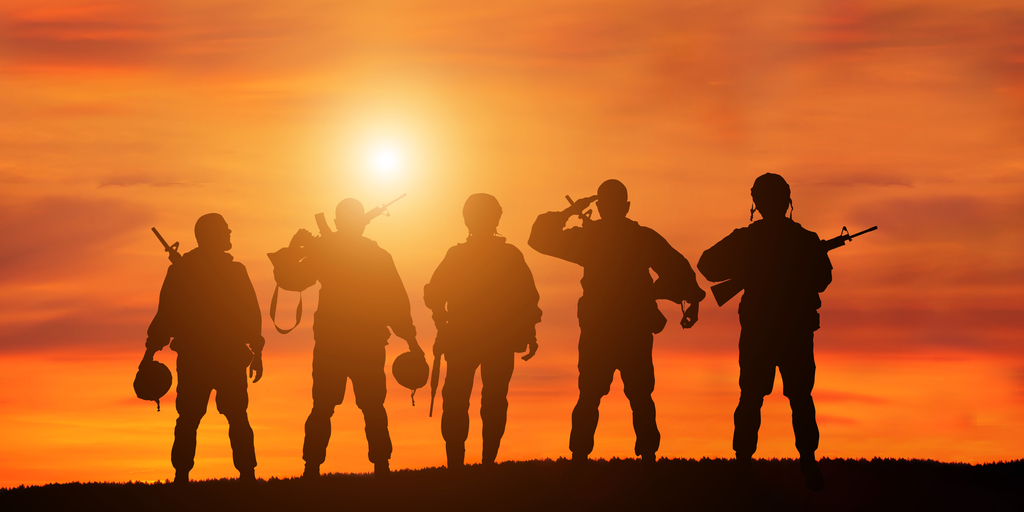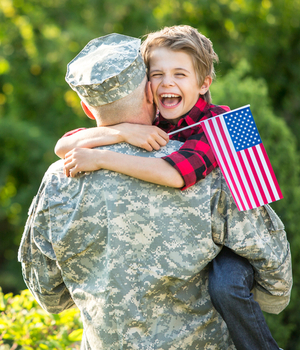Get Help With Alcohol Addiction
- Find meetings near you
- Discover online or in person meetings
- Get 24 hour information on addiction

40 Veteran and Military Alcohol Addiction & Mental Health Support Resources
Military Veterans, particularly those who have seen combat, tend to experience extreme stress, unique pressures, and trauma. Each of these stressors can make coping an extremely difficult task. Alcohol abuse and addiction is a concern among Veterans – particularly when PTSD is diagnosed. Thankfully, there are a number of supportive resources for alcohol addiction and mental health available to assist members of this community and their family members.
Why Veterans Need Alcohol Addiction and Mental Health Support
According to the U.S. Census, there are currently 17.4 million military Veterans in the United States. Research published in the journal Addiction indicates more than 40% of those Veterans will suffer from alcohol use disorder at some point in their lives.
Why is alcohol abuse and addiction more prevalent among members of the armed forces than the rest of society? As it turns out, there are several factors at play.
Contributing factors include:
 Easy access: Military settings often offer easy access to alcohol. In fact, alcohol has become so easy to access that underage drinking in the military is now commonplace.
Easy access: Military settings often offer easy access to alcohol. In fact, alcohol has become so easy to access that underage drinking in the military is now commonplace.- Post-Traumatic Stress Disorder: PTSD and alcohol abuse often go hand in hand. Many traumatized Veterans turn to alcohol as a way to cope with the symptoms of PTSD. Data from the National Institute of Health (NIH) shows nearly 50% of people with PTSD also have a substance use disorder. And according to the Veteran’s Administration (VA), 60-80% of Vietnam Veterans seeking PTSD treatment have alcohol use problems.
- Transition: It can be difficult for Veterans to make the transition from military to civilian life. Many attempt to use alcohol as a way to cope with various stressors and triggers.
- Stress: Even Veterans who aren’t diagnosed with PTSD experience high levels of stress. During their service, they often experience fatigue, high-pressure stress, life and death scenarios, loneliness, and a litany of additional challenges. Additionally, many return home with injuries or other health issues. All of this stress can make Veterans vulnerable to alcohol abuse and addiction.
- Stigma: Some Veterans feel it makes them look “weak” to seek professional help for alcohol abuse issues, while others worry about the perceived stigma of admitting a physical dependence on alcohol. Because they do not get treatment, the alcohol-related problems only get worse.
Veteran Alcohol Addiction Statistics
A look at the following VA statistics reveal the stressors facing Veterans have a significant impact:
- 1 in 10 soldiers returning from the wars in Iraq and Afghanistan abused drugs or alcohol.
- Over 1/3 of service members reported binge drinking in the past month.
- 1 in 10 service members were classified as heavy drinkers in 2018.
- Combat Veterans who are diagnosed with PTSD tend to be binge drinkers.
- A study published in Drug and Alcohol Dependence found that 25% of soldiers misused alcohol after returning home from combat deployment.
Military Veterans Warning Signs of Alcohol Addiction
 A person can become dependent on alcohol gradually or over a short period of time.
A person can become dependent on alcohol gradually or over a short period of time.
Potential warning signs can include:
- Physical symptoms of alcohol withdrawal (nausea, shakiness, insomnia)
- Irritability, agitation, mood swings, anxiety, depression, difficulty concentrating, memory lapses, and blackouts
- Unexplained injuries and falls
- Hiding alcoholic beverages or bottles
- Drinking alone or in private
- Putting oneself or others in danger after heavy drinking
- Continuing to drink despite negative consequences
- Trouble with the law, citations for driving under the influence, public intoxication, underage drinking, assault, domestic violence, child abuse, or child neglect
Military Veterans Organizations & Foundations
- Service Branch Substance Abuse Programs: Veterans can reach out to their respective service branch substance abuse programs:
- Iraq and Afghanistan Veterans of America (IAVA): This organization provides information and resources for Veterans and their families regarding mental health.
- National Center for PTSD: This is the world’s leading educational and research center of excellence on PTSD and traumatic stress. It offers information and treatment options for Veterans who have experienced PTSD.
- Real Warriors: An effort put forth by the Military Health System, promoting support for the psychological health of military personnel. Encourages the military community to reach out for help with depression, anxiety, and PTSD. Links veterans and their families with care and provides free resources.
- Substance Abuse and Mental Health Services Administration (SAMHSA): This agency is part of the U.S. Department of Health and Human Services. Its mission is to reduce the impact of substance abuse and mental illness in the U.S. The site offers links to multiple resources available to Veterans and their families.
- Warriors Heart: This center offers private treatment for veterans and active military who seek treatment for alcohol abuse, chemical dependency, and co-occurring psychological disorders associated with PTSD.
- Wounded Warrior Project: This nonprofit helps Veterans connect with support groups and programs. Their focus is on Veterans who incurred injury or illness while serving on or after September 11, 2001.
Army Substance Abuse Program (ASAP)
Marine Corps Substance Abuse Program
Navy Alcohol and Drug Abuse Prevention
Air Force Alcohol and Drug Abuse Prevention and Treatment (ADAPT) Program
Military Veterans Treatment Directories
- Alcoholics Anonymous: This organization offers free support groups for Veterans and non-veterans who are suffering from alcohol abuse. Meetings are available nationwide, in-person and online.
- Community Care Network: This VA program offers Veterans a direct link to community providers to receive treatment and care.
- Community Provider Toolkit: This site provides information and tools related to Veterans’ mental health. The resources are designed to help community providers who care for Veterans.
- National Resource Directory: This database offers validated resources that support recovery and rehabilitation for Veterans and their family members and caregivers.
- Treatment Program Locator: This site offers a map to find VA substance abuse treatment centers across the country. The site also includes links to additional resources.
- TriCare: This is a health care program for uniformed service members, retirees, and their families. Their mission is to enhance the Department of Defense by providing health support for military personnel.
- VA Substance Abuse Treatment: This page covers information on available support services for alcohol addiction and how to get support through the VA.
- Vet Centers: These are community-based counseling centers that offer services for Veterans and their families. The counseling is designed to help veterans successfully transition to civilian life after a traumatic experience in the military. Referrals are provided to additional VA services.
- Veterans Alcohol and Drug Dependence Rehabilitation Program: This program offers medical, social, vocational, and rehabilitation services to alcohol dependent Veterans. Treatment options include rehab, detox, and psychiatric care.
Military Veterans Resources for Family Members & Loved Ones
 Coming Home Project: This non-profit is devoted to providing care, support, and stress management tools for Iraq and Afghanistan veterans and their families. Free services include counseling, education, training, retreats, and more.
Coming Home Project: This non-profit is devoted to providing care, support, and stress management tools for Iraq and Afghanistan veterans and their families. Free services include counseling, education, training, retreats, and more.- Hope for the Warriors Care Management Services: This organization provides support programs for service members, veterans, and military families. Resources offered focus on health and wellness, peer engagement, and connecting to other community support networks.
- Operation Homefront: This service offers support for Veterans, spouses, and children. Resources include those related to alcohol addiction as well as other issues, including financial assistance.
- Supporting Military Families: This division of the Department of Health and Human Services offers resources and programs specifically designed to support military families. These include many resources for substance abuse and related issues.
- VA Caregiver Support: This VA program provides assistance to family members who care for injured veterans. It offers a support line and information for caregivers.
- VA Mental Health Services for Veterans and Families: This handbook shares what mental health services are available through local and regional VA health care facilities. Offers information for Veterans, Veteran family members, and members of Veterans service organizations.
Military Veterans Media Resources: Podcasts, Videos, Articles, Guides
- Alcohol and Stress in the Military: This publication discusses alcohol abuse and how it relates to military trauma. The article was written by a specialist in PTSD. The site also offers links to additional information and resources relating to alcohol abuse.
- Make the Connection: Watch videos, read stories, and listen to podcasts of Veterans and their loved sharing their experiences, struggles, and recovery. Search 800+ videos by service era, branch, gender, and combat experience to find relatable stories.
- Rethinking Drinking: This site offers information on how drinking affects health. It guides Veterans to examine their drinking patterns to see how their habits may be affecting their health.
- Suicide Prevention and Mental Health Resources Provide Help: You Are Not Alone: This article discusses mental health issues which often co-occur with alcohol addiction and offers resources for support.
- Understanding PTSD and PTSD Treatment: This free booklet offers information about PTSD and treatment options that are available.
Military Veterans Suicide Prevention & Mental Health Resources
- Give an Hour: This site connects Veterans with local mental health clinics for a free counseling session. Search the directory to find a health provider to help with substance abuse, PTSD, anxiety, depression, and other mental health concerns.
- Operation Reach Out: Free suicide prevention app provided by Military Community Awareness, designed to prevent suicide among military personnel and veterans. Developed by a team of suicide prevention experts and designed to encourage people to reach out for help and stay connected with others.
- American Foundation for Suicide Prevention: This suicide prevention site offers information and resources for veterans and their families. The site includes multiple resources for those who may be at risk for suicide.
Military Veterans Crisis Lines
- Homelessness Hotline: Call 877-424-3838. A crisis line for veterans who are currently experiencing homelessness or at risk of homelessness. Family members and supporters of veterans at risk can also call.
- Lifeline for Vets: Call 888-777-4443. Provided by the National Veterans Foundation. Offers crisis management and support for veterans in need.
- Military Helpline: Call 888-457-4838 or text MIL1 to 839863. Available 24/7. Provides free and confidential support to Veterans who are facing difficulties, including suicidal thoughts. The lifeline is staffed by Veterans and others who have experience in the military life.
- Suicide Prevention Lifeline: This site offers main crisis line info (800-273-8255) and additional resources for veterans and service members in crisis.
- Veterans Crisis Line: 800-273-8255 – Call for confidential crisis support. For Veterans and their loved ones. Available 24/7.
- Women Veterans Call Center: Call 855-VA-WOMEN. This service is offered by the VA for female Veterans. Callers can speak to staff about any issues, including alcohol addiction.
References:
- https://www.census.gov/topics/population/veterans.html
- Results From the National Health and Resilience in Veterans Study. Addiction.
- Implications for screening, diagnosis and treatment. Drug and Alcohol Dependence.
- Posttraumatic Stress Disorder and Co-Occurring Substance Use Disorders: Advances in Assessment and Treatment. Clinical Psychology.
- https://www.hillandponton.com/ptsd-and-vietnam-veterans/
- PTSD: National Center for PTSD: PTSD and Substance Abuse in Veterans
- Institute of Medicine of the National Academies: Substance Use Disorders in the U.S. Armed Forces
- 2018 Department of Defense Health Related Behaviors Survey (HRBS) Results for the Active Component
- Substance use disorders in Iraq and Afghanistan veterans in VA healthcare. Drug and Alcohol Dependence.